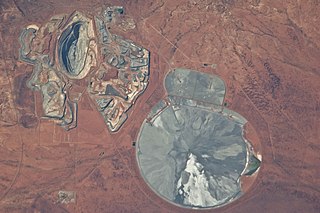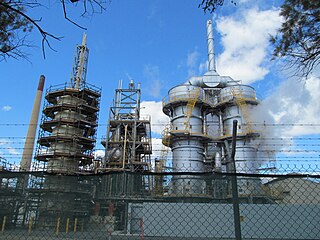Related Research Articles
BNC may refer to:

Vale Canada Limited is a wholly owned subsidiary of the Brazilian mining company Vale. Vale's nickel mining and metals division is headquartered in Toronto, Ontario, Canada. It produces nickel, copper, cobalt, platinum, rhodium, ruthenium, iridium, gold, and silver. Prior to being purchased by CVRD in 2006, Inco was the world's second largest producer of nickel, and the third largest mining company outside South Africa and Russia of platinum group metals. It was also a charter member of the 30-stock Dow Jones Industrial Average formed on October 1, 1928.
Freeport-McMoRan Inc., often called Freeport, is an American mining company based in the Freeport-McMoRan Center, in Phoenix, Arizona. The company is the world's largest producer of molybdenum, a major copper producer and operates the world's largest gold mine, the Grasberg mine in Papua, Indonesia.
Anglo American plc is a British multinational mining company with headquarters in London, England. It is the world's largest producer of platinum, with around 40% of world output, as well as being a major producer of diamonds, copper, nickel, iron ore, polyhalite and steelmaking coal. The company has operations in Africa, Asia, Australia, Europe, North America and South America.
Bindura is a city in the province of Mashonaland Central province, Zimbabwe. It is located in the Mazowe Valley about 88 km north-east of Harare. According to the 1982 Population Census, the city had a population of 18,243. This rose to 21,167 in the 1992 census and in the 2012 census it had reached 46,275. It is the administrative capital of the province. Bindura Nickel, now called Trojan Nickel Mine, a subsidiary of Mwana Africa plc, mines nickel, copper and cobalt in the area and operates a smelter refinery just south of the town. Cotton and maize are grown intensely in the region. The first basic school in Bindura opened in 1912.

KGHM Polska Miedź S.A., commonly known as KGHM, is a Polish multinational mining corporation headquartered in Lubin, Lower Silesia, Poland. Founded in 1961 as a state enterprise, the company is considered a major global producer of copper and silver. Since 1997, it has been listed on the Warsaw Stock Exchange (WSE). The company is also a component of the WIG30 stock market index.
Vedanta Resources Limited is a diversified mining company headquartered in London, United Kingdom. It is the largest mining and non-ferrous metals company in India and has mining operations in Australia and Zambia and oil and gas operations in three countries. Its main products are Zinc, Lead, Silver, Oil & Gas, Iron Ore, Steel, Aluminium and Power. It has also developed commercial power stations in India in Odisha and Punjab.

United Company RUSAL, international public joint-stock company is the world's second largest aluminium company by primary production output. It was the largest until overtaken by China Hongqiao Group in 2015. UC RUSAL accounts for almost 9% of the world's primary aluminium output and 9% of the world's alumina production.

Eurasian Natural Resources Corporation PLC (ENRC) was a public, Kazakhstan/Central African-focused, multinational leading diversified natural resources company headquartered in London, United Kingdom. It had activities in integrated mining, processing, energy, logistics and marketing.

Stillwater Mining Company is a palladium and platinum mining company with headquarters located at Littleton, Colorado, United States. It is the only palladium and platinum producer in the USA. The only other North America based palladium/platinum producer is North American Palladium, located in Canada. In 2017 it was acquired by Sibanye Gold Limited, who then began trading as Sibanye-Stillwater
Asa Resources Group is a mining company based in Johannesburg and London. According to the company's website, it is the first African-owned and African-managed business to be listed in the Resources sector of the London Stock Exchange's Alternative Investment Market. Asa was founded in 1987.

Mount Keith Mine is an open pit nickel mine in Western Australia. It is operated by BHP. The site's closest landmark is the town of Wiluna, 85 km (53 mi) to the north.
JCI or Johannesburg Consolidated Investment Co. Ltd. was founded in 1889 by the British entrepreneur Barney Barnato. JCI was a major force in South African mining for over 100 years. Using his investments in the Kimberley diamond fields, particularly his 25% share in De Beers, Barnato foresaw the value of and invested in the potential of the Witwatersrand gold mines. At first he bought small but rich mines near Germiston – the New Primrose, named after his daughter, and others in the same region.
The second-largest mineral industry in the world is the mineral industry of Africa, which implies large quantities of resources due to Africa being the second largest continent, with 30.37 million square kilometres of land.With a population of 1.4 billion living there, mineral exploration and production constitute significant parts of their economies for many African countries and remain keys to economic growth. Africa is richly endowed with mineral reserves and ranks first in quantity of world reserves for bauxite, cobalt, industrial diamond, phosphate rock, platinum-group metals (PGM), vermiculite, and zirconium.

Hindustan Copper Ltd. is a central public sector undertaking under the ownership of the Ministry of Mines, Government of India. HCL is the only vertically integrated government-owned-copper producer in India engaged in a wide spectrum of activities ranging from mining, beneficiation, smelting, refining and continuous cast rod manufacturer.

Nickel mining in Western Australia has been an industry that has had many fluctuations of fortune in its history. Large fluctuations in the world nickel price have seen mines close and reopen on several occasions.
Gencor Ltd was a South African based mining company. It was formed in 1980 after the merger of the General Mining and Finance Corporation and the Union Corporation. Parts of the company are now owned by Gold Fields and BHP.

The Kwinana Nickel Refinery is a nickel refinery in East Rockingham and Kwinana Beach, Western Australia. The refinery is operated by BHP and part of its Nickel West operations. Having originally been built by WMC Resources, it changed ownership in 2005 when BHP acquired WMC.
References
- 1 2 3 4 5 "Bindura Nickel Corp in the red", Chronicle (July 5, 2018)
- 1 2 "BNC pins hopes on feasibility study", Melody Chikono, The Independent (August 5, 2019)
- 1 2 "Chaos at Bindura!", The Herald (October 28, 2015)
- ↑ "Anglo American to Sell Stake in Bindura Nickel", AngloAmerican (April 15, 2003)
- 1 2 3 "BNC finalising takeover bids amid Tagwirei shadow", Alois Vinga, New Zimbabwe (September 27, 2019)
- ↑ "Bindura says Chimimba victim of carjacking", Eric Chiriga, The Standard (May 3, 2006)
- 1 2 "Zimbabwe's Bindura okays $10m loan from Mwana", Reuters (September 22, 2011)
- ↑ "Mwana Africa to carry out rights issue", Author, Reuters (March 8, 2010)
- ↑ "Mwana May Delist Bindura in Zimbabwe, Trade Own Stock", Vernon Wessels and Ron Derby, Bloomberg (October 6, 2009)
- ↑ "Mwana Africa restarts work at Zimbabwe mine", Biz Community (November 8, 2012)
- 1 2 "Mining firm slapped with $20m lawsuit", Nehanda Radio (January 4, 2017)
- 1 2 Mwana widens FY loss after $43.7m BNC impairment charge, South Africa: Mining Weekly, 2013
- ↑ "Zimbabwe 'unlikely' to seize mine stakes", News24 (April 27, 2013)
- ↑ "BNC smelter upgrade important short-term focus for Mwana", Leandi Kolver, Engineering News (January 29, 2014)
- ↑ "Bindura Nickel Corporation soars 136%, best ZSE performer", Sunday Mail (July 27, 2014)
- ↑ "BNC plunge drags mining index", The Sunday Mail (September 13, 2015)
- 1 2 "Chinese exit Bindura", Kuda Chideme, Newsday
- ↑ "Chinese oust Mwana's Mpinga", Mining Journal (June 10, 2015)
- 1 2 "Mpinga guns for BNC chair", Chronicle (August 6, 2015)
- 1 2 "BNC to dismiss 350 workers", Oliver Kazunga, Chronicle (December 15, 2015)
- ↑ "BNC back in the black", The Independent (December 5, 2016)
- ↑ "Lack of funding stalls Trojan mine smelter", Author, Zimbabwe Independent (December 15, 2017)
- ↑ "Mwana chief Mpinga ousted after upheavals", Tawanda Karombo, iOL (June 11, 2015)
- 1 2 3 "Zimbabwe’s Bindura Nickel sounds alarm on going concern status", Memory Mataranyika, MiningMx (June 28, 2018)
- ↑ "BNC lobbies RBZ to up forex retention threshold", Fidelity Mhlanga, The Standard (December 1, 2019)
- ↑ "BNC seeks special power tariff", Fidelity Mhlanga, NewsDay (November 2019)
- ↑ "BNC injects $3m in projects", Michael Tome, Nehanda Radio (January 20, 2020)